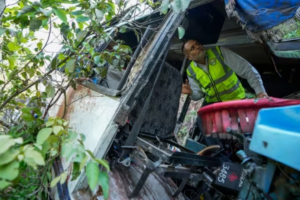Days of student protests sparked political turmoil and crisis in Bangladesh. Sheikh Hasina, the Prime Minister of Bangladesh, resigned and fled the country, fearing the violent protests. This marks the end to the 15-year rule of the former prime minister. The Prime Minister’s Office and official residence remain in chaos after protesters invaded the residence following the resignation of Ms. Hasina. The images of students invading the official residence have gone viral on many social media platforms.
Following the collapse of the Bangladesh government with the departure of Sheikh Hasina, an interim government led by Muhammad Yunus is formed. Muhammad Yunus has taken oath on August 7th as the head of an interim government at Bangabhaban. President Mohammad Shahabuddin administrated the oath to the 84-year-old Nobel Laureate. The former managing director of Grameen Bank, Yunus, was sworn in as the Chief Advisor, a position that is similar to that of a prime minister. It is important to note that no one from Ms. Hasina’s party, Awami League, was present at the ceremony.
Who are the members of the interim government?
It comprises a 16-member council of advisors that are assigned to lead the crisis-ridden Bangladesh for a short period of time. Additionally, the council will also overlook the transition of power from the interim to the elected government. Student leaders Nadid Islam and Asif Mahmud Sajib Bhuiyan have joined the interim government in Bangladesh headed by Muhammad Yunus. Additionally, Brigadier General (retd) M. Sakhawat Hossain, Farida Akhtar, AFM Khalid Hossain, Nurjahan Begum, Sharmeen Murshid, Supradip Chakma, Bidhan Ranjan Roy and former Foreign Secretary Touhid Hossain are a few prominent figures among the advisory council members.
Violet Protests in Bangladesh
The political climate of Bangladesh has been volatile as early as the January 7 elections, when Ms. Hasina’s Awami League had a landslide victory. However, the voting system was widely criticized to be unfair and corrupt. The first major wave of student-led protests began in June, due to the Bangladeshi high court restoring a thirty percent reservation in government employment for veterans and family members of those who fought for freedom in Bangladesh’s 1971 War of Independence. The violent nature of the protests is clear since it is reported that 450 people were injured. The students demanded a job allocation system that was based on merit and hence, launched an anti-quota protest. Moreover, the nation’s Supreme Court eventually reduced the quota, but students were enraged at Ms. Hasina’s handling of the demonstrations and her alleged use of an offensive term for the students.
The protest was further aggravated with students demanding the resignation of Ms. Hasina. Additionally, the clash between the agitators and the police took an ugly turn. Over 100 people were dead, while dozens were injured across the nation. Following this violent encounter, lakhs of protestors filled the streets and paced towards the Prime Minister’s official mansion in Bangabhaban.
The Indian embassy stated, “In view of the ongoing situation in Bangladesh, the Indian community members and members and the Indian students residing in Bangladesh are advised to avoid travel and minimize their movement outside their living premises.”
Furthermore, many Indian students residing in Bangladesh have been impacted by the social unrest. The Indian High Commission in Dhaka has issued a statement in this regard, urging for Indian citizens and students in Bangladesh to stay indoors amidst the anti-quota protests. This news comes after Bangladesh shut down all public and private universities following the political unrest in the country.
Advertisement




